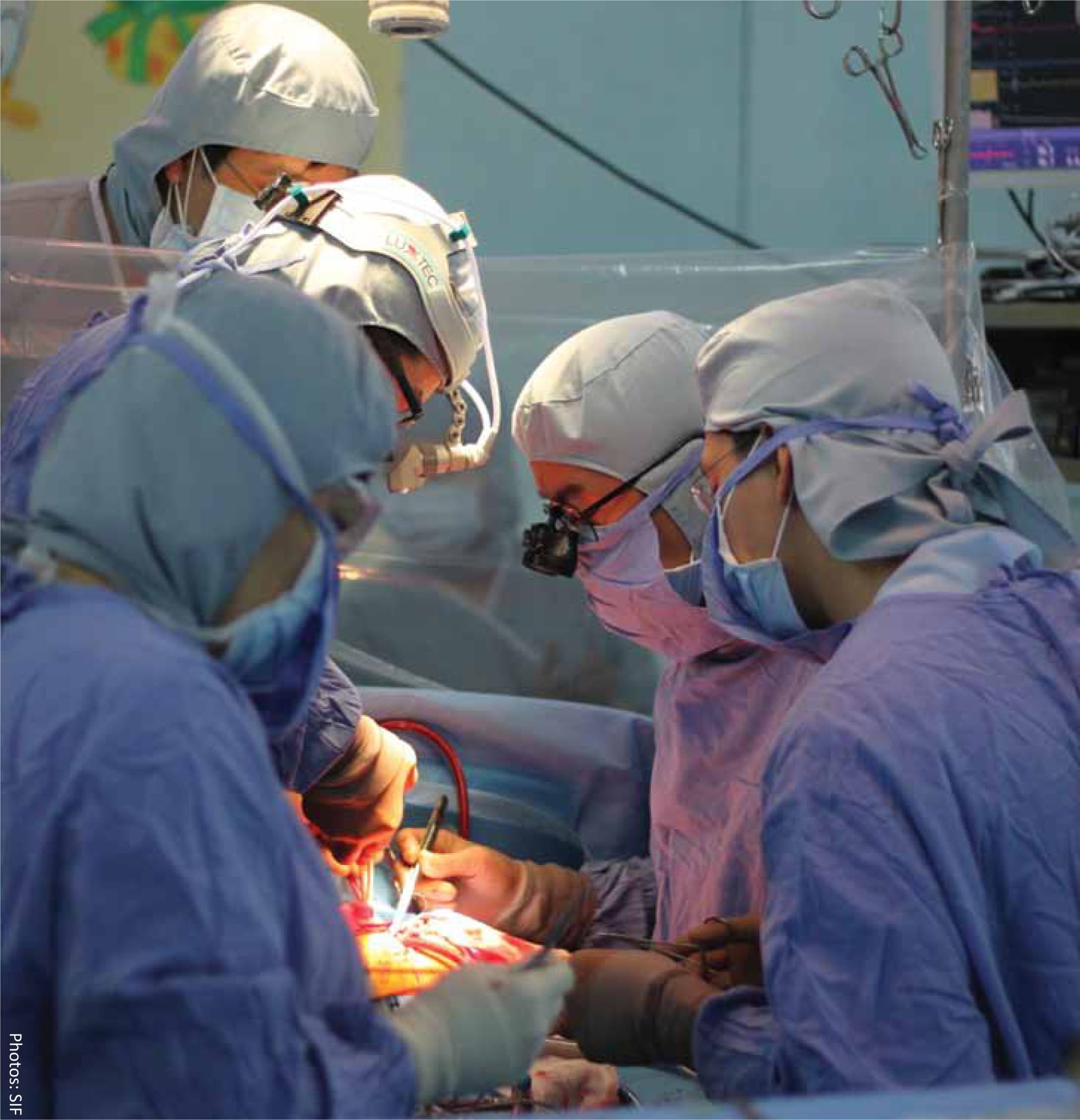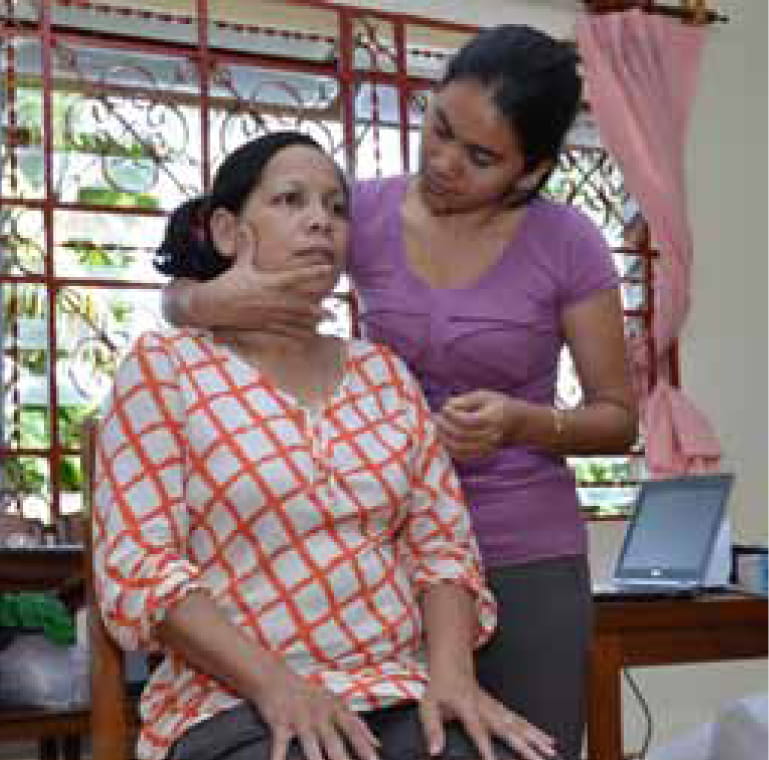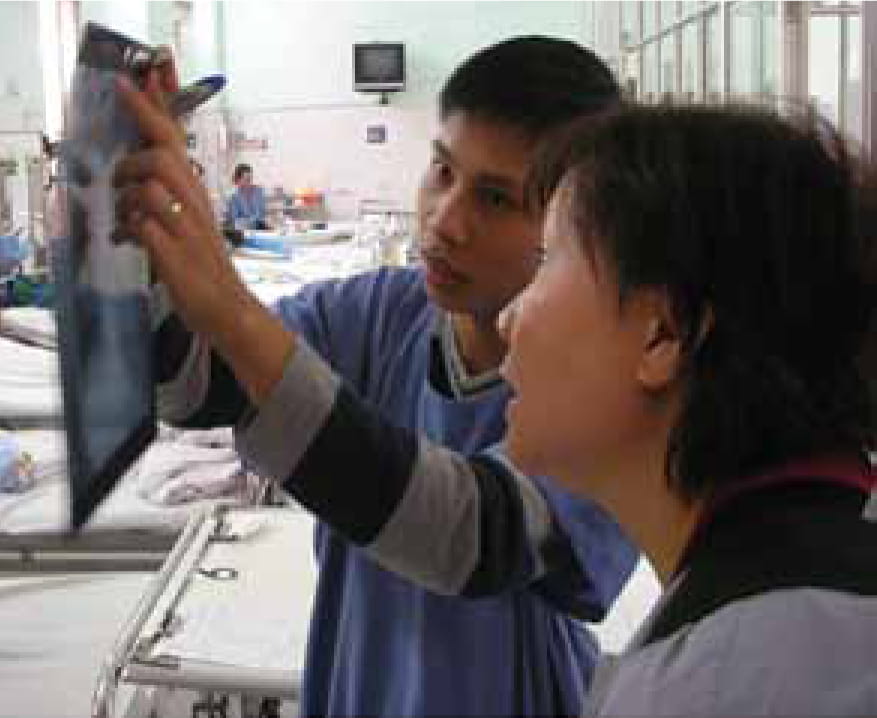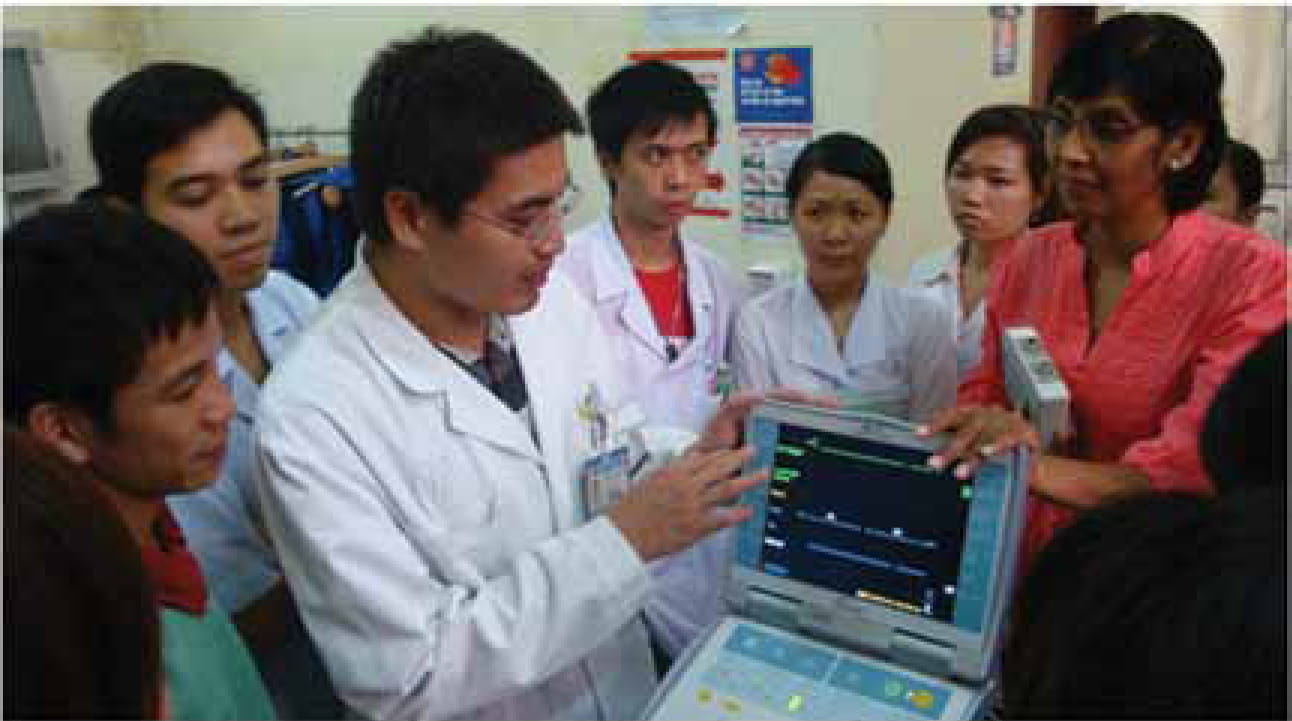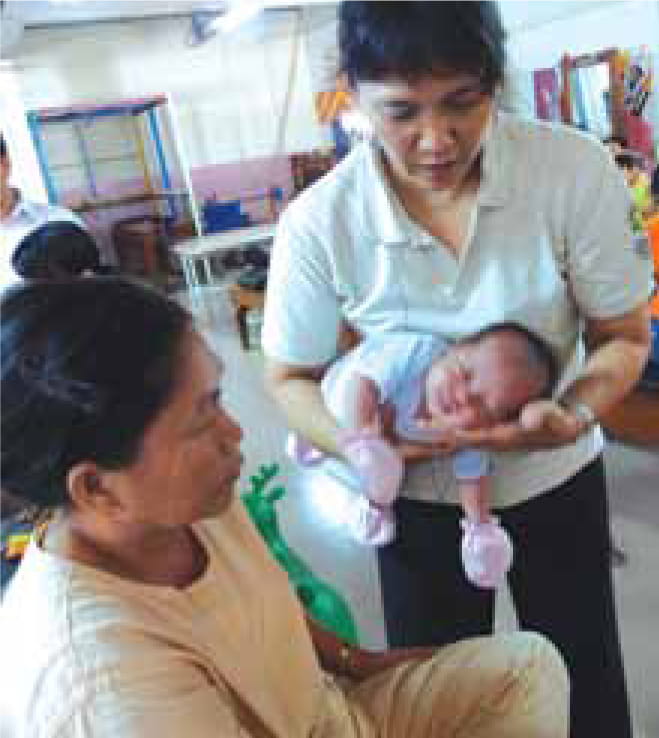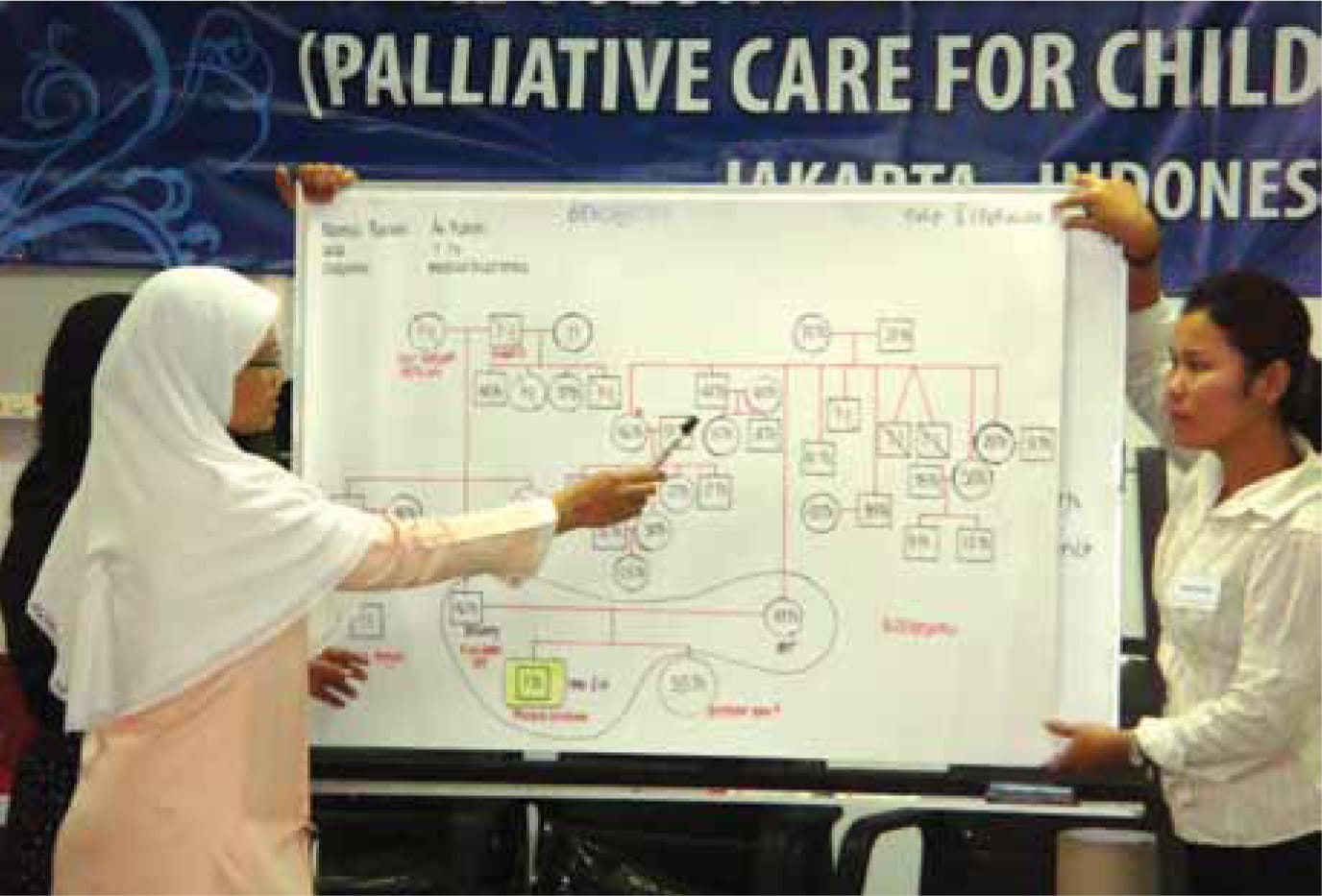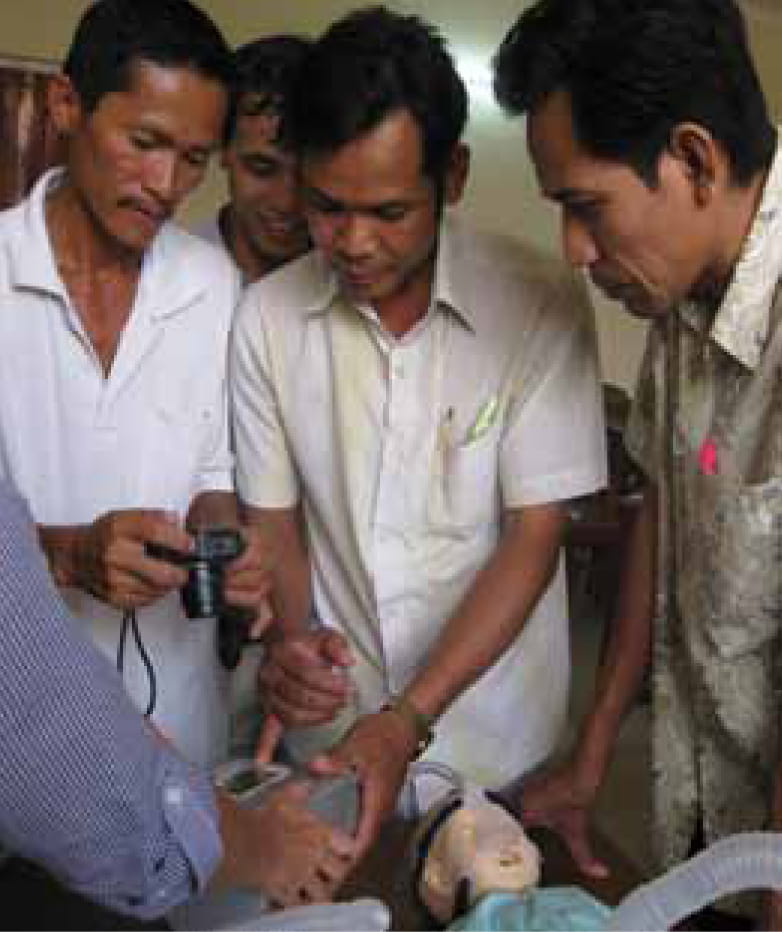Stories > Going The Distance
Going The Distance
A SIF Paediatric Cardiac Care project in Vietnam.

Since the mid-1990s, the Singapore International Foundation (SIF) has mobilised a wide spectrum of highly-skilled professionals who have contributed to improving lives in developing countries through carrying out skills training over short volunteer stints on projects spanning a few years. But has this short term voluntarism model yielded sustainable results?
By Melissa De Silva
ver three years, Associate Professor Lim Swee Hia, a nurse from Singapore’s National Heart Centre, volunteered with the Singapore International Foundation’s (SIF) Cardiac ICU Nursing project in Vietnam.
The team of volunteers from Singapore had a clear mandate — sharing their professional skills with their Vietnamese peers. Says Lim, “We also helped them look at processes, protocol and guidelines. We even trained the trainers — there were 10 of them — and they are now doing the training for the rest of the nurses there.”
Associate Professor Lim was able to share her skills with the Vietnamese medical professionals while managing her work commitments in Singapore because the volunteer trips in short stints of one to two weeks each at the hospital in Vietnam, stretched over three years.
“Volunteering is a passion for me,” she says. “I’ve been doing it since I was a school girl. This short term volunteering is a good arrangement. We go there for one to two weeks, a few times over three years. This way we can open up this opportunity to our other nursing colleagues to go overseas and work and learn in a different culture versus only one person going for one whole year. That may not give others a chance to go.”
A Necessary Model
Associate Professor Lim’s situation is typical of many Singaporeans’ — heavy work commitments that make volunteering in an overseas community for months a virtual impossibility. For this reason, in the mid-1990s, SIF went against the grain of international voluntarism models and came up with its own model of short term volunteering. This ‘Specialist Team’ approach has highly skilled specialists sent out in multi-disciplinary teams to impart their skills to their peers from organisations in a developing country. Volunteers work with the organisation for one to two weeks, making a few trips over the long term of more than two years. In this way, professionals who are pressed for time but have extensive expertise and passion are able to be part of an international volunteering effort.
However, not everyone is convinced.
A Cambodian speech therapist practising some of the techniques learnt through the speech therapy training, which launched in 2008 and is the first of its kind offered in Cambodia.
“There is debate on whether the short-term model is effective because of the prevailing belief that for true developmental impact, volunteers must live and work in the community, that only such long term commitment can bring about positive changes on the ground,” explains Margaret Thevarakom, Director of International Volunteering at SIF.
Facing Facts
“We say that this short term model is sustainable, but is it?” she asks. While the organisation was sure there were positive effects to their short term model, it was mostly from anecdotal evidence. So when the organisation turned 21 in 2012, it seemed timely to take a hard, honest look at the impact of its work in Asia. A study was commissioned to evaluate the long term impacts of these projects from the perspectives of the host agency staff.
Expanding Care for Terminally-ill Children
The three-year partnership between the SIF and Indonesian NGO, Rachel House (Yayasan Rumah Rachel) aimed to improve care for terminally-ill children. The project sought to enhance medical and nursing staff’s (or professionals’) knowledge and clinical skills for in-patient and homecare palliative services for children.
Specialist volunteers comprising a multi-disciplinary team of doctors, nurses, psychologists and social workers trained a core team of nurses at Rachel House as well as medical professionals from other healthcare institutions. They in turn, trained 1,000 other Indonesian healthcare professionals on adopting a holistic approach to palliative care. It includes relieving the patient’s suffering in all areas of his/her life and harnessing the emotional support of family.
Volunteers on a home visit in Jakarta, Indonesia, as part of the paediatric palliative care training for local caregivers.
As a result, Rachel House is one of the first paediatric palliative care service providers in Indonesia. Today, the Rachel House homecare model is endorsed by the National Association of Nurses (PPNI or Persatuan Perawat Nasional Indonesia) as the homecare model to be replicated in Indonesia. Watch the video at www.sif.org.sg/story_details.php?id=218
A discussion over an X-ray during the Cardiac ICU Nursing Project in Vietnam.
“My department has now created many guidelines. This was an impact of the SIF project … guidelines on removing intubation tubes, replacing bandages … and observing patients for 6 hours after heart surgery. Before … we did not have these protocols.”
— A trainee from the Cardiac Nursing project in Vietnam
A training session at the Vietnam National Heart Institute.
The study which covered 12 SIF healthcare projects in three countries — Indonesia, Vietnam and Cambodia – concluded between two and 10 years ago. For each project, 15 to 19 host agency staff were interviewed, and one SIF volunteer. The research aims were to measure the impact of short-term volunteer-driven Specialist Team projects in three areas: Institutional capacity building, improving service quality and building trust and relationships between Singapore and host communities.
The study (Creating Sustainable Impact Through Short Term Volunteering in Asia: An Analysis of Singapore International Foundation’s Health Capacity Building Projects in Indonesia, Vietnam and Cambodia) was carried out by independent consultants Dr. Emma Louise Jones and Dr. Caroline Brassard, Assistant Dean of Academic Affairs and Senior Lecturer at the Lee Kuan Yew School of Public Policy at the National University of Singapore.
Findings from the study showed that there was significant impact recorded in the three areas of outcome.
The Cambodian Experience
A case that illustrates the study’s findings is the speech therapy project in Cambodia. In 2008, SIF and the Caritas Centre for Children and Adolescent Mental Health (CCAMH), collaborated on the first of its kind speech therapy training in Cambodia. Singaporean volunteers who were speech therapists went to Cambodia to train medical and allied health professionals, special needs education teachers, and psychologists from over 10 organisations in the country. It was a milestone for Cambodia that saw disability management professionals convening in the country to exchange knowledge and skills to raise professional standards in the sector.
Associate Professor Celia Tan (carrying baby), Director of the Singapore General Hospital Postgraduate Allied Health Institute, was part of the team of specialist volunteers. They conducted a year-long training programme in Cambodia for the Advanced Certificate in Physiotherapy Practice, awarded by the Singapore General Hospital Postgraduate Allied Health Institute (SGH-PGAHI). Read the story at www.sif.org.sg/story_details-190.
Said a trainee from the speech therapy project in Cambodia. “The Singaporeans [volunteers] taught us to give children a choice in the therapy, to encourage them, even if they cannot speak, they can blink their eyes. We now know that it is not good to force them. With the new skills I can now help the kids to stop drooling, to strengthen their molar muscle and stimulate senses around their mouths. Now we have much better results than before.”
Over five years (2008 to 2013), SIF and the CCAMH have collaborated to train 48 speech therapists to enhance the standard of treatment and care of children with feeding and communication problems in Cambodia. As a result, up to 2,800 children being served by these trainees received enhanced care for their specific needs.
Palliative Care project in Jakarta, Indonesia.
The collaboration which began in 2003 extends beyond the five-year partnership. Over the past 10 years, more than 60 Singaporean volunteers have supported various initiatives with CCAMH such as building disabled friendly playgrounds, skills training in disability management such as autism, special needs education, occupational therapy and speech therapy. As a result, CCAMH is now one of the leading agencies in training special educationists and therapists in Cambodia’s disability treatment sector.
A practical demonstration of resuscitation techniques during the Pediatric Intensive Care Training Project in Cambodia.
The Cambodian example underlines the study’s key findings — that the projects based on a short term model of voluntarism yielded long term sustained impact on multiple levels — individual trainees, host agencies, the local professional sector, and even influenced national policymaking. It was presented at the International Volunteer Cooperation Organisation Conference 2012 in Ottawa, Canada and garnered much interest as it contributes to emerging research on this little-known aspect of volunteer-driven work, against a wider backdrop of developmental efforts around the world. Ultimately, the results celebrate what these Singaporean and overseas professionals are passionate about and have been tirelessly working towards — saving and uplifting lives.
The Gift of a Healthy Heart
Three-year-old Vietnamese girl, Pham Hiem Suong, was diagnosed with the heart condition, ‘Tetralogy of Fallot’, when she was six months old. This defect inhibits the heart’s ability to pump sufficient blood to the rest of the body. Without surgical intervention, children with this condition seldom live beyond their teens.
The Children Hospital No. 2 in Ho Chi Minh City, Vietnam, was one of SIF’s partners in the Paediatric Cardiac Care Project. The three-year initiative was launched in 2011 to build the clinical competencies of the hospital’s cardiac unit so that infant mortality rates resulting from congenital heart disease could be reduced.
Born with a serious heart defect, three-year-old Pham Hiem Suong (pictured at right) was given a new lease of life, thanks to the Paediatric Cardiac Care project which saw a collaboration between Singaporean and Vietnamese doctors.
Over the three years, a team of eight medical professionals from KK Women’s and Children’s Hospital (KKH) in Singapore conducted six week-long training programmes for 40 medical staff at Children’s Hospital No. 2. Each training programme focused on managing a specific cardiac condition, and comprised classroom lectures, case study discussions, ward rounds and joint surgeries. Watch the video at www.sif.org.sg/story_details.php?id=129

